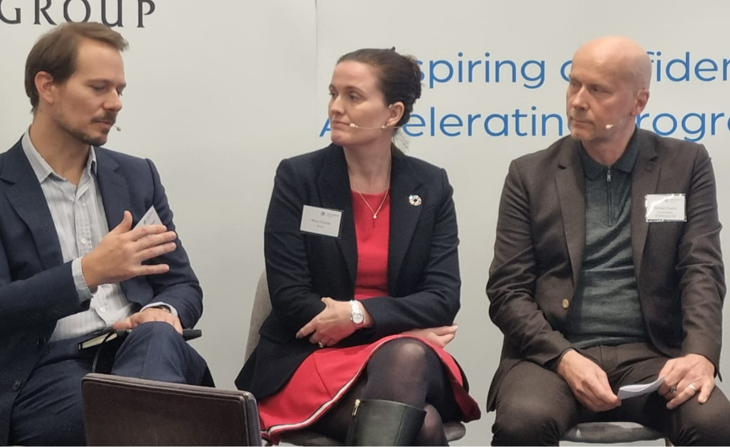
Institutional investors are missing out on a huge swathe of urban regeneration projects and involvement in massive plans to encourage the world’s most profitable cities to be more climate resilient due to a lack of ‘bankable’ projects.
This view came from a variety of speakers at an event to launch a new report last week, which looked at the most prominent risks faced by global cities. Insurance investors were urged to reach out and work with cities to find more projects and, in turn, cut their own underwriting claims in the future.
“Cities across the world lack the infrastructure and robust environmental policies needed to combat the worsening impacts of climate change,” said the report. It found that London, New York, Paris, Singapore, and other insurance and investment hubs’ futures were threatened by more extreme flooding and failure to keep pace with technology.
The Resilient Cities Index 2023, which was created by Economist Impact and sponsored by Tokio Marine Group, delves into 25 global cities’ ability to evade, withstand, and recover from a spectrum of shocks and long-term stresses that are becoming more pressing due to rapid urbanisation.
In a panel discussion with several leaders on the topic, most said that there was a gulf between governments of cities and national leaders and this, in turn, stopped institutional investors from working on projects to fix this.
“The pipeline of projects to encourage investors to invest
in them is small."
The group called on these investors – particularly insurers – to instead work with them and think long-term to avoid expensive underwriting claims in coming decades due to flooding, excess heat, and other issues already hurting urban areas. This was echoed by panel moderator Brad Irick, Executive Officer of Tokio Marine Group and CEO of Tokio Marine Kiln, himself from Houston, which Irick said had been battered by severe flooding and ice storms in recent years. He discussed the city's vulnerability and the necessity of more resilience in the world’s urban financial centres.
Alice Charles – a speaker on the panel, Director at engineering firm Arup in its integrated Cities, Planning & Design sector, and formerly the Lead for Cities, Infrastructure & Urban Services at the World Economic Forum – said the issues raised in the report were widespread and particularly felt by institutional investors.
She added that, often, cities tried to engage with these entities with projects that could prove beneficial, particularly for insurers that warn against spiralling natural catastrophe costs due to climate change.
“When you get to the city-level there is a complete lack of city projects
collected at the national level, so there’s a lack of a pipeline of projects.”
However, the lack of synergy in this area was proving detrimental. Charles said this was because cities weren’t seen as ‘bankable’ and often lacked more experienced and professional ways of dealing with the investment community in order to ‘win’ them on business cases.
“The pipeline of projects to encourage investors to invest in them is small,” she said, referencing investors who want to invest more in sustainable projects and other risk mitigation or climate adaptation opportunities but lack available options. “When you get to the city-level there is a complete lack of city projects collected at the national level, so there’s a lack of a pipeline of projects.”
She said that city government engagement from investment and other sources of funding is typically siloed around a particular issue – transport or climate resilience, for example – rather than focused at a more holistic level. “[The cities] lack financing resources; they’ll have urban planning partners, but they often lack resources [in other areas]. They’re not structuring projects with the right business case so someone would want to invest in them. That’s a real lack of technical process within the city,” she added.
Charles added that imbalance this fed into a conversation about risk-sharing. “Many investors in the UK at the moment will cite political risk as the greatest concern they were thinking about when investing in cities.”
As to why insurers and their investment teams should be at the forefront of areas like this, Charles noted that they are the ones with the most comprehensive data on risk, which could make a big difference to what kind of projects are proposed. “Insurers have that, and sharing data is hugely important,” she said.
One of the most pressing reasons for not seeing more investment, however, was the duration gap mismatch between the investment life-cycle and the governments of cities and their planning cycles. “Investors want to see a long-term strategy, and this is really difficult to achieve because infrastructure requires long-term investment and [investors] want to see a cross-party long-term strategy, which is almost impossible to achieve because mayors are generally in office for about five years and then change and bring in a new strategy.”
“Our kids will judge us, if, in fifteen years, we say that “we did a cost-benefit
analysis, and your future wasn’t worth it.”
The other panellists also highlighted the ‘bankability’ aspect. Michael Pawlyn, Director at Exploration Architecture Limited, said, “I would challenge what ‘bankable’ means, and ask the investors to take a longer-term view.”
He added that he had worked on many projects that involved the construction of progressive buildings that were better environmentally and offered more social payback to the local area but were told that the period it needed to recoup an investment was too long. “We were told the economics ‘weren’t right’ if payback was longer than five years, and that’s frustrating.”
Pawlyn added that this required a much longer-term holistic outlook. “Our kids will judge us, if, in fifteen years, we say that “we did a cost-benefit analysis, and your future wasn’t worth it,” was his conclusion.